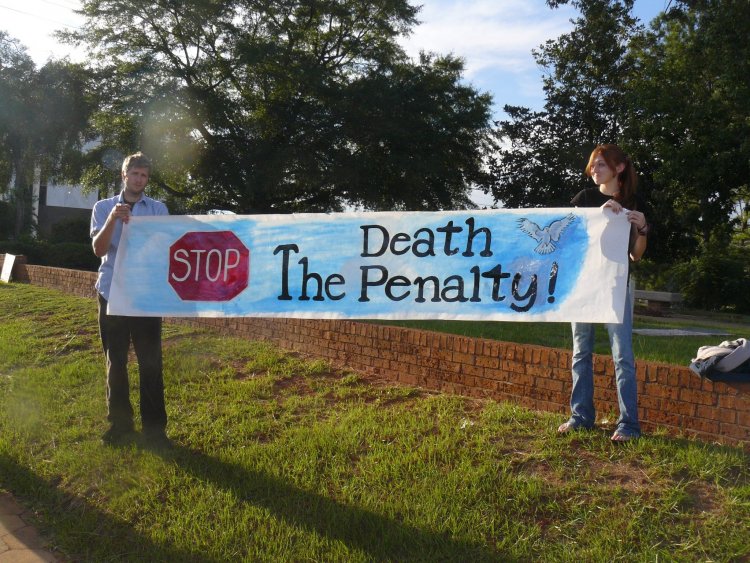International Day Against the Death Penalty: Relation between Capital Punishment and Torture

11-10-2022
Beatrice Serra
International Justice and Human Rights Researcher
Global Human Rights Defence
On October 10th, the international community commemorates the International Day Against the Death Penalty to raise awarness and analyse the relationship between capital punishment and torture or other cruel, inhuman, and degrading treatment or punishment. With numerous States still recurring to death sentence, it is crucial to reflect on the progress made so far, but most importantly on the efforts indeed to achieve the full abolition of capital punishment worldwide. (United Nations, 2022; African Commission, 2022)
The United Nations and the majority of its members refuse death penalty and push towards its full abolition, labelling it as a practice contrary to human dignity, human rights protection and development. Yet, no international instruments generally prohibits capital punishment, albeit some treties and conventions limit its use. (UNODC, n.d.) According to international standards, “in countries which have not abolished the death penalty, sentence of death may be imposed only for the most serious crimes,” as enshrined in Article 6(2) of the International Covenant on Cvili and Political Rights (ICCPR). However, individuals oftentime are convicted on death row for economic crimes, drug-related offences, victimless offences, and actions relating to moral values including adultery, prostitution and sexual orientation. (International Bar Association, 2008) Having one of the world’s highest rates of execution, along with China, Iran and Egypts, Saudi Arabia domestic legislation allow death penalty for crimes such as murder, drug offences, apostasy, sorcery and witchcraft, with no exception for children. (Statista, 2022; Amnesty International, n.d.) Saudi Arabia is not an isolated case, it is rather representative of how authoritarian regimes utilise capital punishment as a political tool to silence dissident voices and peaceful political protests.
On a human rights perspective, death penalty is strongly condemned for numerous reasons. Above all, its irreversible nature carries on the risk of depriving individuals of their fundamental right to life with no remedies in case of errors. The US legal system offers a clear example of such a drawback, with numerous detainees wrongly sent to death row despite no clear evidence. In this context, convictions are mainly related to socio-economic disadvantages and vulnerability of racial, ethnic or religious minorities which have limited access to legal representation and safeguards of due process. Evidence shows that the majority of death penalty cases worldwide are linked to gross unfair trials, oftentimes based on evidence obtained under torture. (Amnesty International, n.d.) As acknowledged by the European Court of Human Rights in the Case of Öcalan v. Turkey (2005),
“to impose a death sentence on a person after an unfair trial (art. 14 ICCPR) is to subject that person wrongfully to the fear that he will be executed… Such anguish cannot be dissociated from the unfairness of the proceedings underlying the sentence which, given that human life is at stake, becomes unlawful under the Convention… the imposition of a capital sentence in such circumstances must be considered, in itself, to amount to a form of inhuman treatment.”
Moreover, according to international and regional tribunals, certain methods of execution may amount to torture or cruel, inhuman and degrading treatment, such as the use of the gas chamber, of electric chair, as well as public executions considered as contrary to human dignity. Despite being legal according to international law, debates are ongoing regarding the use of lethal injections because of it causing an extremely painful and slow death combined with paralysis. (International Bar Association, 2008)
In light of international law, the lack of provisions explicitly prohibiting death penalty in any circumstance may appear illogical. (International Bar Association, 2008) Nevertheless, the efforts of the majority of member states to spread a culture of zero tolerance to capital punishment is an important step forward. Analyzed from a human rights perspective, the only possible solution to the matter of death penalty will be its full abolotion. Indeed, as warned by Alice Edwards, UN Special Rapporteur on Torture and Other Cruel, Inhuman, or Degrading Treatment or Punishment, and Morris Tidball-Binz, Special Rapporteur on extra-judicial summary or arbitrary executions, “… it is almost impossible for States to impose capital punishment while meeting their obligations to respect the human rights of those convicted. Abolition of the death penalty is the only viable path.” (United Nations, 2022)
Sources and Further Readings:
African Commission (October 10, 2022), Communiqué de Presse sur la Journée Internationale Contre la Peine de Mort, African Commission Press Release, retrieved on October 11th, 2022, from https://www.achpr.org/fr_pressrelease/detail?id=661.
Amnesty International (n.d.), Death Penalty, Amensty International, retrieved on October 11th, 2022, from https://www.amnesty.org/en/what-we-do/death-penalty/#:~:text=Reasons%20to%20abolish%20the%20death%20penalty&text=Execution%20is%20the%20ultimate%2C%20irrevocable,row%20on%20grounds%20of%20innocence.
European Court of Human Rights, Case of Öcalan v. Turkey, Judgment, May 12th, 2005, retrieved on October 11th, 2022, from https://hudoc.echr.coe.int/fre#{%22itemid%22:[%22001-69022%22]}.
International Association Bar (May 2008), The Death Penalty under International Law: A Background Paper to the IBAHRI Resolution on the Abolition of the Death Penalty, International Association Bar, retrieved on October 11th, 2022, from file:///C:/Users/39340/Downloads/Deathpenalty-Paper%20(4).pdf.
Statista (May 2022), Number of Executions worldwide in 2021, by Country, Statista, retrieved on October 11th, 2022, from https://www.statista.com/statistics/267304/number-of-executions-worldwide/.
United Nations, International Covenant on Civil and Political Rights, December 16th, 1966, https://www.ohchr.org/en/instruments-mechanisms/instruments/international-covenant-civil-and-political-rights.
United Nations (October 10, 2022), UN experts warn of associated torture and cruel punishment, United Nations, retrieved on October 11th, 2022, from https://www.ohchr.org/en/press-releases/2022/10/un-experts-warn-associated-torture-and-cruel-punishment.
United Nations Office for Drugs and Crimes (UNODC) (n.d.), The Death Penalty and Organized Crime, UNODC, retrieved on October 11th, 2022, from https://www.unodc.org/e4j/zh/organized-crime/module-10/key-issues/death-penalty-and-organized-crime.html.




 GHRTV Author
GHRTV Author 




























